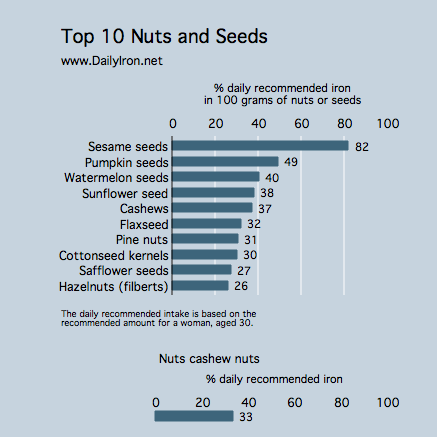Cashews contain 6 milligrams of iron per 100 grams. Grams is a measure of weight. To put 100 grams in perspective, consider alternative measures for this food:
- 1 cup equals 137 grams.
- 1 oz equals 28 grams.
In the category of nuts and seeds, we included whole nut and seed products in the Top 10 list, including cashew butter which is a bit more dense than cashews and a little bit higher in iron as a result. Foods may be fortified with iron but are not included in this Top 10 list. The food tested for the particular graph below can be described more specifically as:
Cashew nuts, dry roasted, with salt added
Read more about iron in nuts and seeds or visit our iron-rich foods list.

Cashews and Iron
Cashews do contain a good bit of iron but as with all plant-based sources of iron (non-heme iron), they contain iron blockers that keep you from absorbing all of the iron that you otherwise would. For this reason, if you are shopping for a nut that is to become a core part of your diet, you should know that nuts and seeds may not be your best option. They can complement a mixed diet nicely, but if they are a dietary staple, we recommend following some of the instructions we have on this site for preparing grains and beans. Cashews can be soaked, for instance, and then dehydrated to create a crunchy nut snack. Soaking will reduce the iron inhibitors moderately (though there is little food science research on this topic). You could make your own cashew flour and use that in baking as per the instructions on this site (check out the iron rich foods tips page). If you are simply looking for a snack, then just enjoy the cashews.
Generally, if a food is to be a staple in your diet and you need the dietary iron in it, follow the strategies on this site to reduce the iron inhibitors.
Find out more about the iron content of your favorite foods by searching for them on this site.